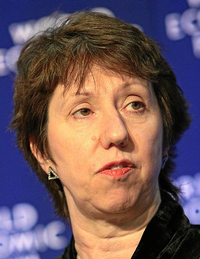Last week, the European Union (EU) filled the two new positions established by the recently ratified Lisbon Treaty -- president of the European Council and EU high representative for common foreign and security policy. Most of the press coverage following the appointments has focused on the personalities of the individuals selected for the jobs. But this preoccupation with personalities risks obscuring the more profound implications of the EU's first steps toward implementing the treaty's provisions.
Commentators have generally disparaged the selection of Belgian Prime Minister Herman Van Rompuy as president and Britain's EU Trade Commissioner Catherine Ashton as foreign policy chief, comparing them unfavorably to more prominent candidates such as former U.K. Prime Minister Tony Blair and current U.K. Foreign Minister David Miliband. The New York Times reported that "the selection of such low-profile figures seemed to highlight Europe's problems instead of its readiness to take a more united and forceful place in world affairs."
But even if more prominent individuals had been selected to the new EU positions, the organization is unlikely to become a great security power in the near future. The Washington Post probably better reflected the mood among D.C. foreign-policymakers than the Times, when it wrote that the Von Rompuy and Ashton's "obscure backgrounds and lack of experience virtually guarantee that they will not supplant national leaders as figures on the world stage or as interlocutors with Washington. That's probably just as well."

